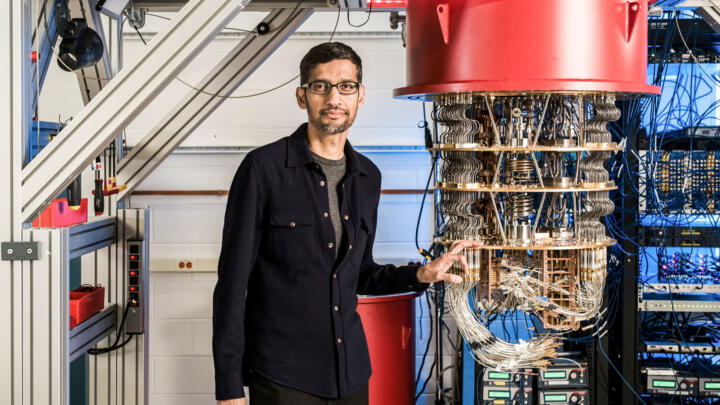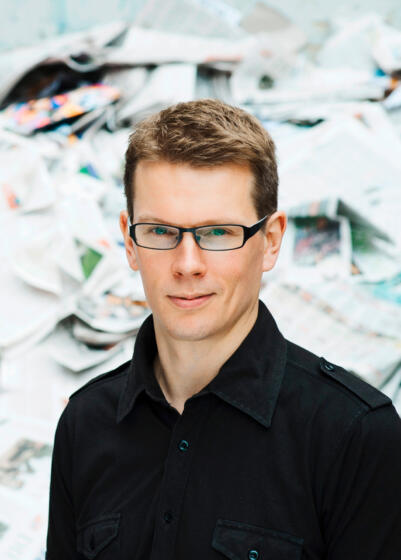
A machine to be reckoned with
The international community of physicists is still excited about the issue: Has Google’s quantum computer “Sycamore” actually achieved so-called quantum supremacy as the scientists from Mountain View wrote in their paper published in the October issue of the science journal “Nature” – or “just a little” as their main competitor, IBM, was quick to argue in a paper of its own?
The search engine giant states that it took Sycamore exactly three minutes and 20 seconds to perform a task known as random circuit sampling, which is about having the quantum computer calculate numerical sequences and subsequently testing if they truly follow a distribution specified by quantum physics. It would take its adversary, “Summit,” a supercomputer based on normal bits and bytes, 10,000 years to solve the same computing problem. By the way, Summit, the world’s fastest supercomputer since 2018, is from IBM.

Job sharing by quantum and supercomputers
Director of IBM Research Dario Gil wasn’t just going to leave this outcome uncommented: If intermediate results of this computation were to be stored on hard discs instead of in the random access memory, it wouldn’t take Summit 10,000 years but, in the worst case, just 2.5 days. Consequently, it wasn’t appropriate to talk about true quantum supremacy in its strict definition that a conventional supercomputer was totally chanceless against a quantum computer in solving specific problems.
Gil is even critical of the use of vocabulary: The word “supremacy” implied that quantum computers were always better than supercomputers and will completely displace them. That, however, is exactly not the case, says Gil’s German colleague Ingolf Wittmann, who drives quantum computing in Europe: “Instead, quantum computers and conventional supercomputers will be sharing jobs in the future.”

Qubits instead of bits
Quantum computers will only be used where conventional supercomputers reach their limits, the expert explains. For instance, in the field of chemistry: “The composition of the caffeine molecule is not particularly complicated and has 95 electrons. However, if you wanted to calculate its exact binding energy you’d need more classical bits than atoms exist in the universe.” A quantum computer with 160 quantum bits – abbreviated as qubits – would be able to solve this problem, according to Wittmann’s assessment. The massive difference in computing power is that qubits function in a completely different way than normal bits. While the latter can always just assume the two values of “0” or “1,” an intermediate state exists for qubits, which means that the qubit can represent both values at the same time. However, the whole thing only becomes really exciting when several qubits are combined, which physicists refer to as entanglement.
Performance grows exponentially
If two entangled qubits simultaneously contain four states, this means eight states with three qubits, 16 states with four qubits, and so on. The number of states grows exponentially with the number of entangled qubits. 20 qubits roughly equate to the computing power of a classic notebook, says Wittmann. Systems with 53 qubits such as Sycamore and those offered by IBM as well are ranked in the high-performance computing (HPC) class led by Summit. HPC computers are continuously improving, too, says Wittmann. However, the workhorse Summit already has a 520 square meter (5,600 square feet) footprint and a power rating of 13 megawatts. If its computing power were to be doubled, its footprint and power rating would double, too. To achieve the same performance increase of a quantum computer it would only be necessary to add a single qubit. That, however, is no mean feat: qubits that IBM and Google are talking about are atoms which in complex apparatus have to be cooled down to near-absolute zero, i. e. to 15 millikelvin (–273.135 °C / –459.675 °F).

Resolving a conflict
However, by comparison, this is almost the easier part of the task. The other one, that is the required ability to systematically manipulate these cryogenic atoms while protecting them against external influences, calls for even more engineering tricks. A lot of time will pass before a real universal quantum computer with about one million qubits that more than likely would also be able to unlock all current conventionally used encryption technologies exists. “We’re anticipating a period of 20 to 30 years,” Wittmann explains.
f you think you understand quantum mechanics, you don’t understand quantum mechanics
Nobel prize winner Richard Feynman,
American physicist (1918–1988)
Even so, he says, it pays for companies to pursue the subject of quantum computers even at this juncture. For one, because the first smaller computations with which quantum computers achieve a real advantage over conventional computers can be expected to be available in the next three years. And for the other “because one should know how to use a quantum computer once it’s arrived.”
Autonomous driving as a use case
That’s why many companies are already evaluating what computing problems would be suitable for a quantum computer. In addition to calculations of chemical compounds in medicine and industry, they include optimizations or portfolio risk analyses – as well as the acceleration of production process flows, which not only saves costs but also improves the quality of the products and thus enhances customer value. A practical case in point: the complex computations for autonomous driving will only be possible with the help of quantum computers, according to Volkswagen’s assessment.
Schaeffler is keeping track of the subject of quantum computers with great interest as well. Schaeffler and IBM experts most recently engaged in an exchange on the subject at the end of October. Many of the aforementioned use cases for the mega computer are highly attractive for the automotive and industrial supplier. Therefore, Schaeffler’s answer to the question “What’s in it for us”? is: quite a bit – at least expectations.
A small quantum glossary
Qubit or quantum bit
The elementary computing unit of a quantum computer, which may be an atom, a photon or neutron that uses effects of quantum mechanics to represent exactly two states, such as 0 and 1, similar to the bits in a conventional computer
Superposition
Qubits can be in the two states of 0 and 1 at the same time – which is referred to as superposition. They’ll “choose” a state only when being measured. Quantum algorithms can use superposition to massively shorten computations.

Entanglement
Einstein referred to this quantum effect also as “spooky action at a distance.” When two qubits are entangled in superposition any changes of one qubit will immediately impact the other one – no matter how far apart they are from each other. Quantum algorithms take advantage of this.
Quantum supremacy
The expression refers to the point in time at which a quantum computer is able to solve a specific complex problem much faster than a conventional supercomputer based on silicon chips.



